Paul W. Kirk Jr Wetland Research Awards
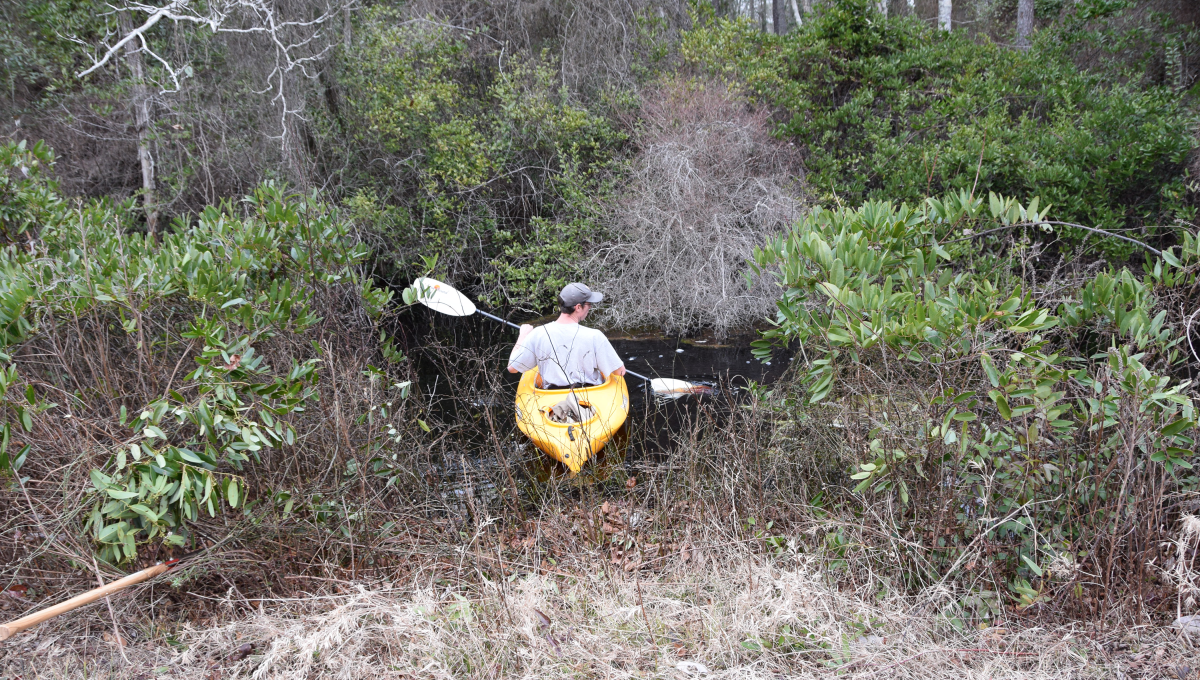
Nick Flanders kayaking to a research site in the forested wetlands of Great Dismal Swamp National Wildlife Refuge, Suffolk VA
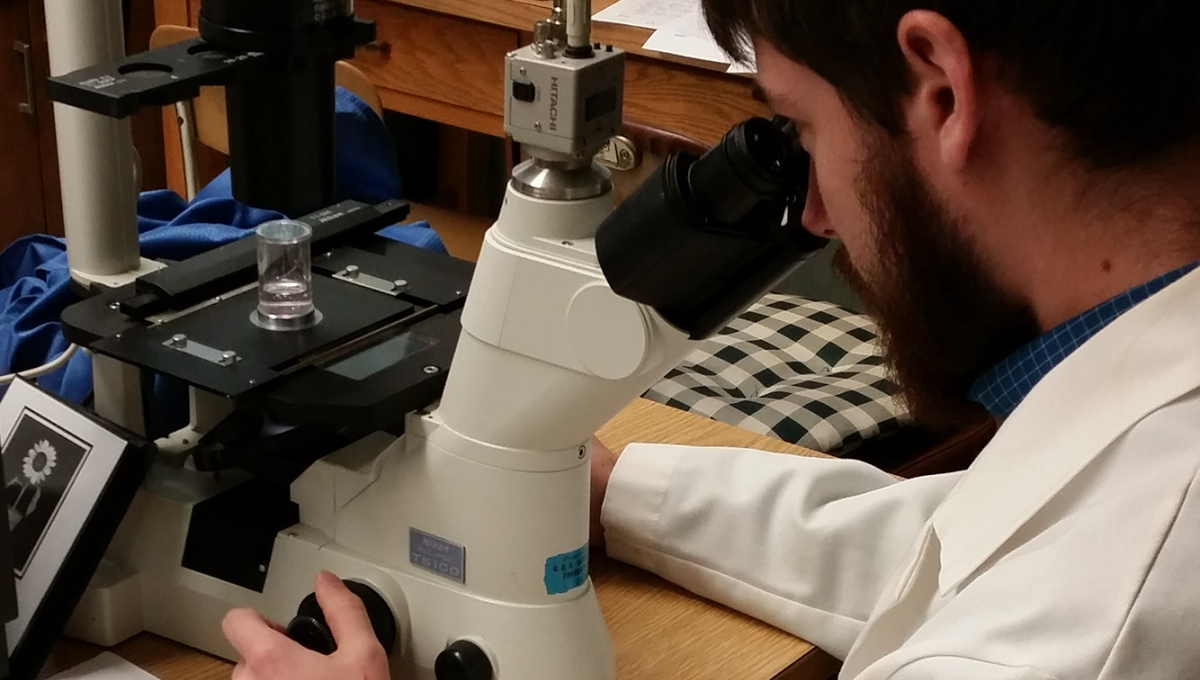
Charles Sandusky, Old Dominion University Phytoplankton Analysis Laboratory, identifying benthic algal species
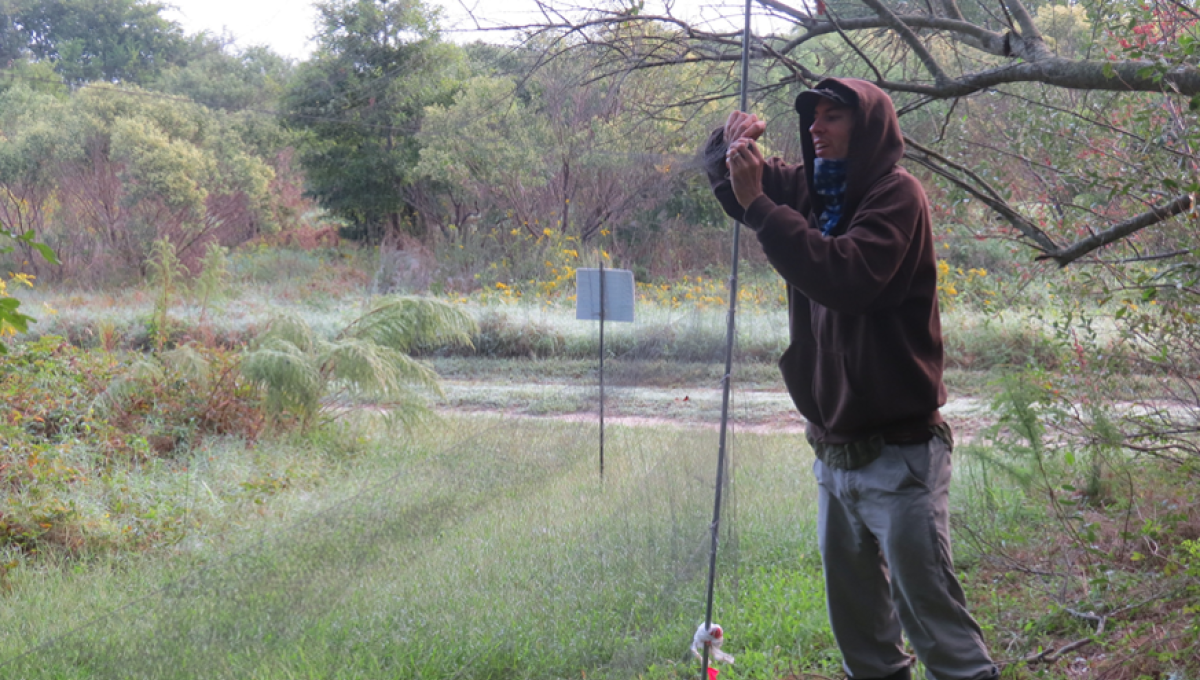
Chance Hines extracting a songbird from a mist net at Kiptopeke State Park.
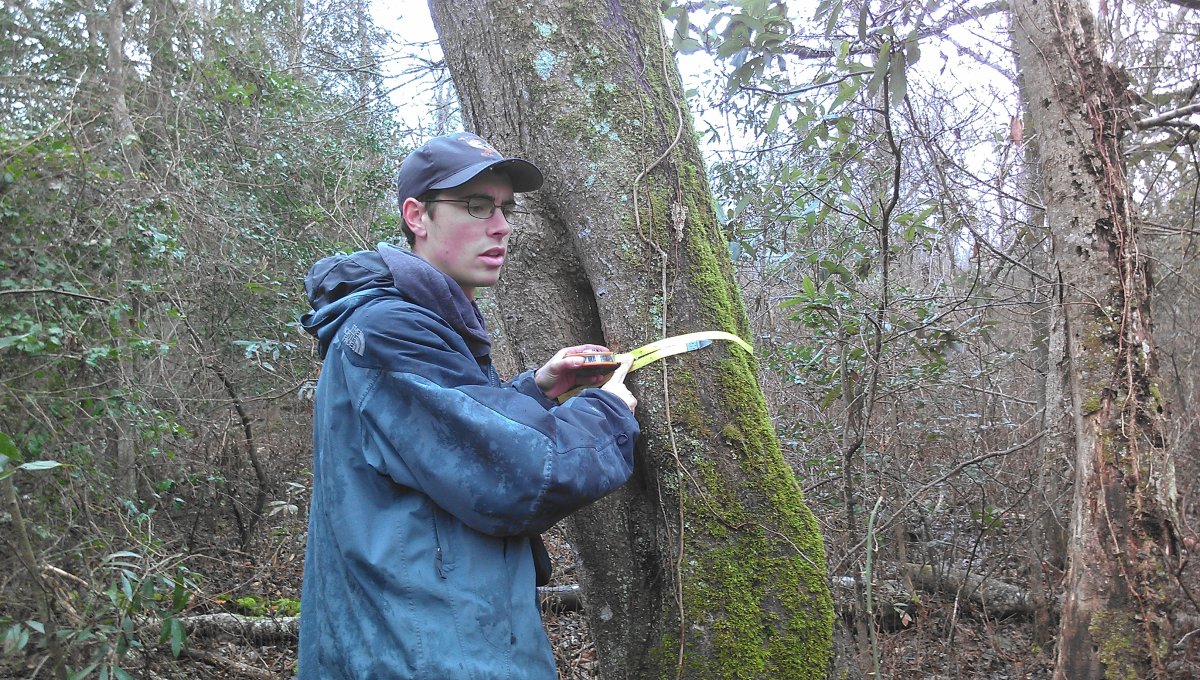
Nick Flanders measuring tree diameters at a research site in the forested wetlands of Great Dismal Swamp National Wildlife Refuge, Camden Co. NC.
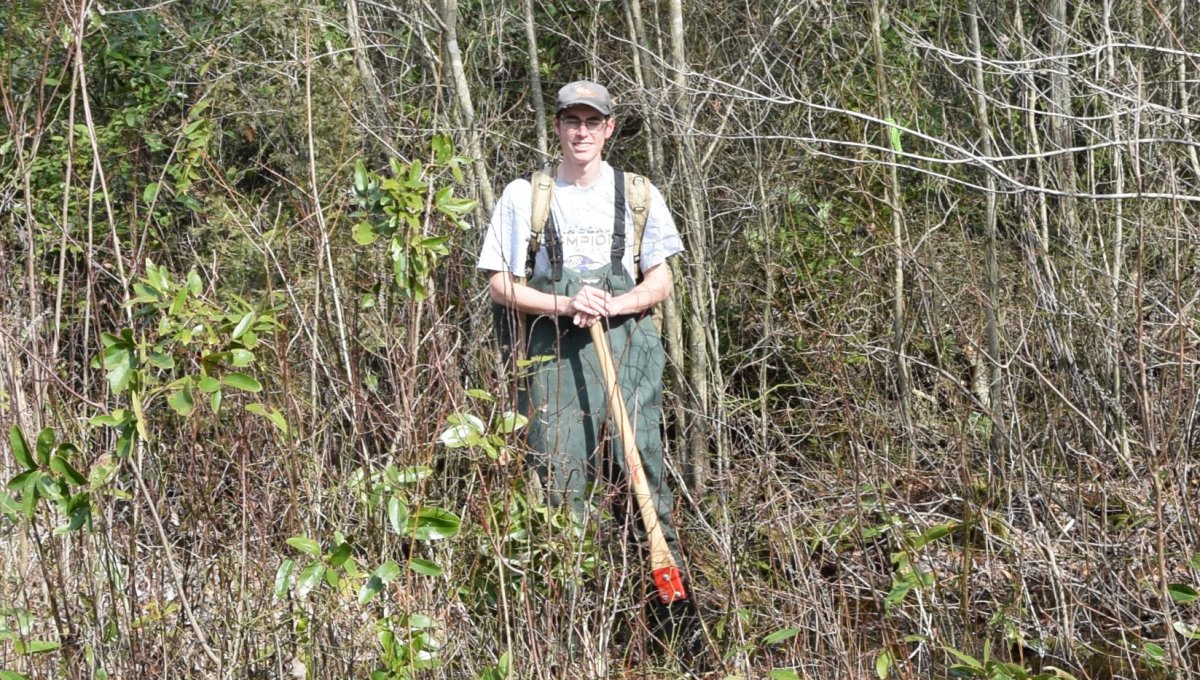
Nick Flanders cutting a trail to a research site in the forested wetlands of Great Dismal Swamp National Wildlife Refuge, Suffolk VA
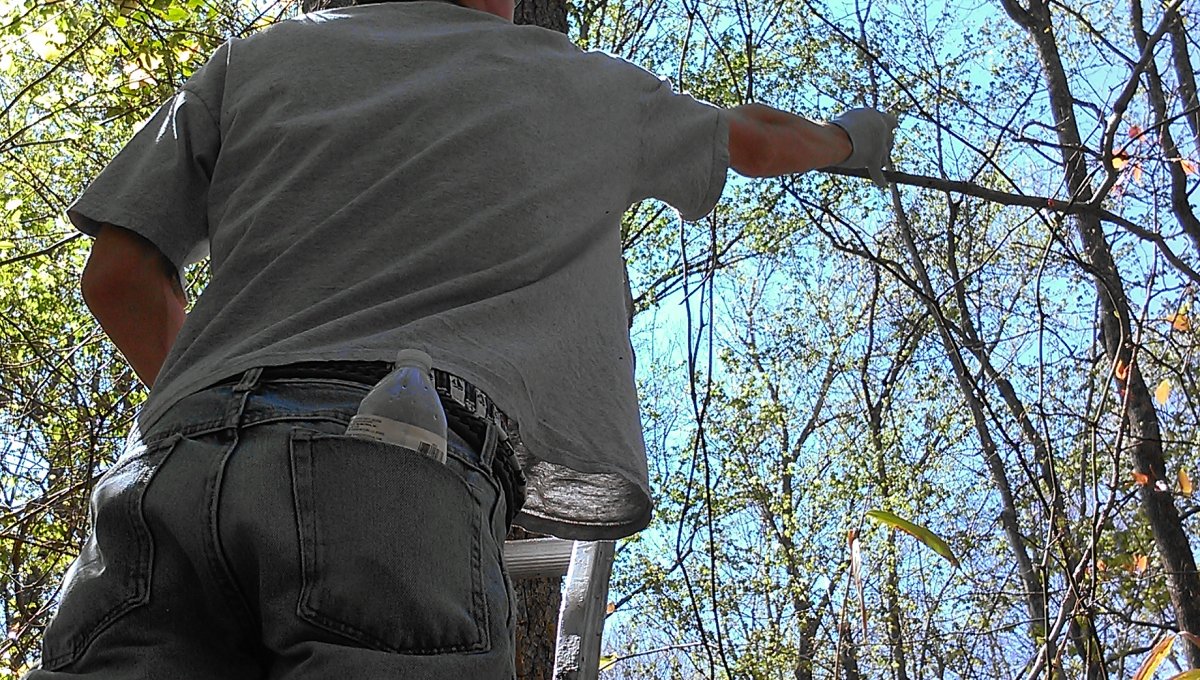
Nick Flanders planting mistletoe seeds at a research site in Great Dismal Swamp National Wildlife Refuge, Suffolk VA as part of a field experiment.
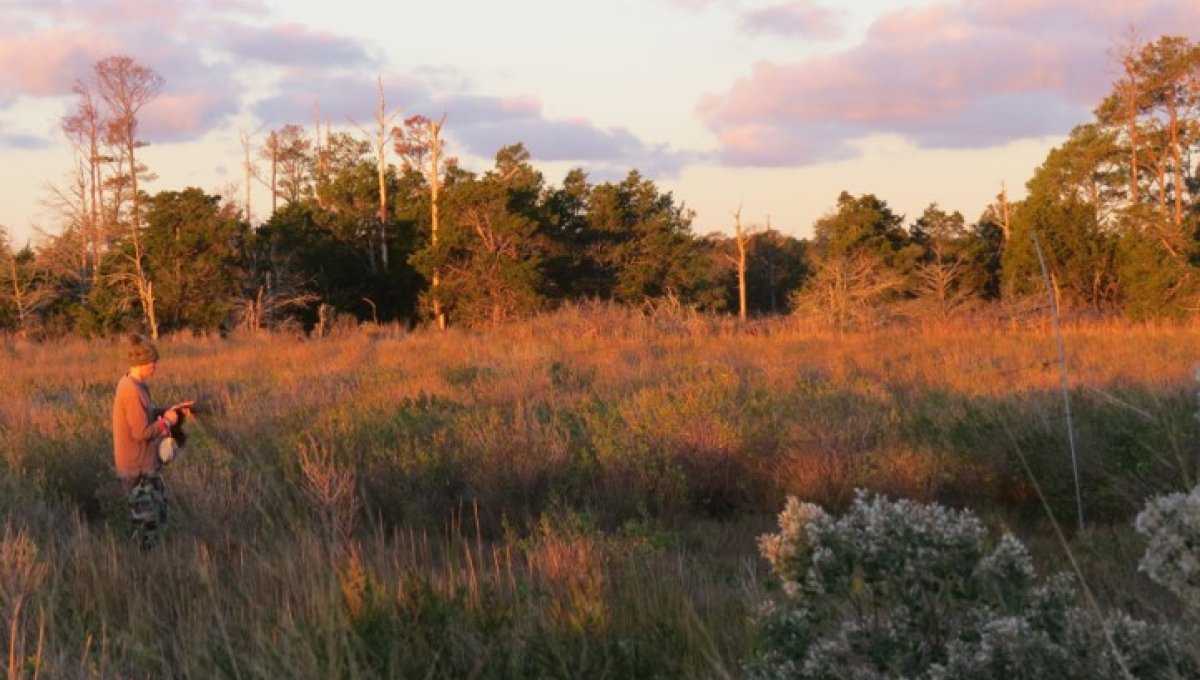
Chance Hines setting up a mist net in high marsh habitat to capture migratory songbirds at Magothy Bay NAP.
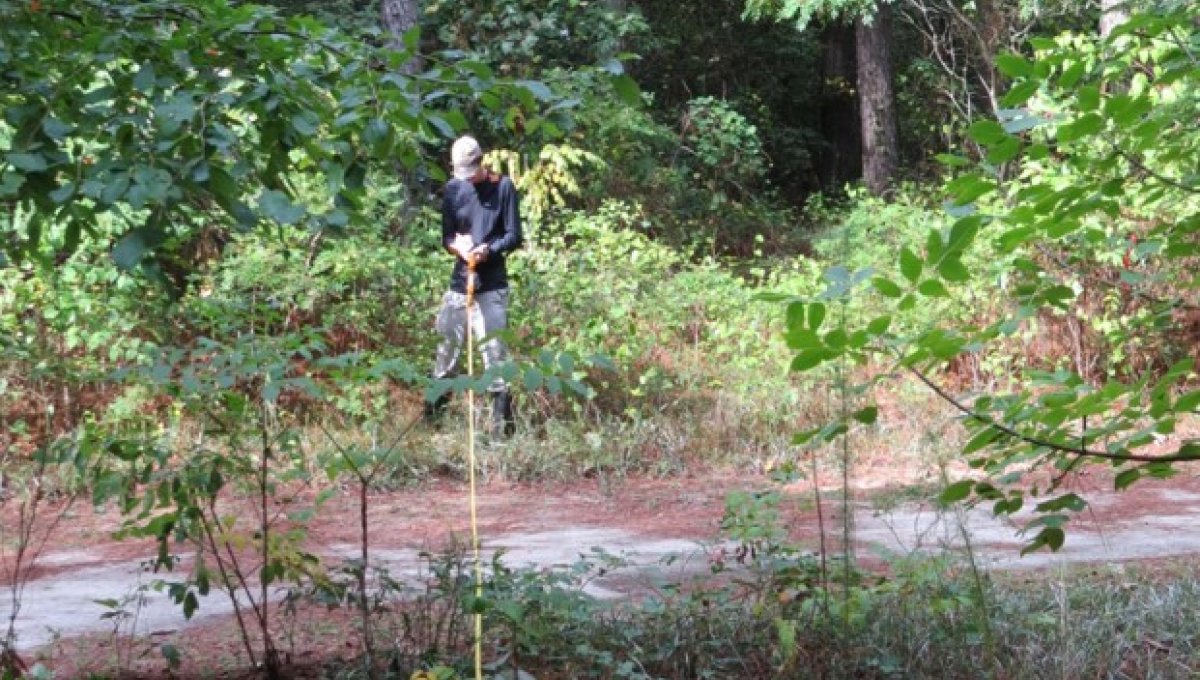
Chance Hines measuring vegetation at Kiptopeke State Park.
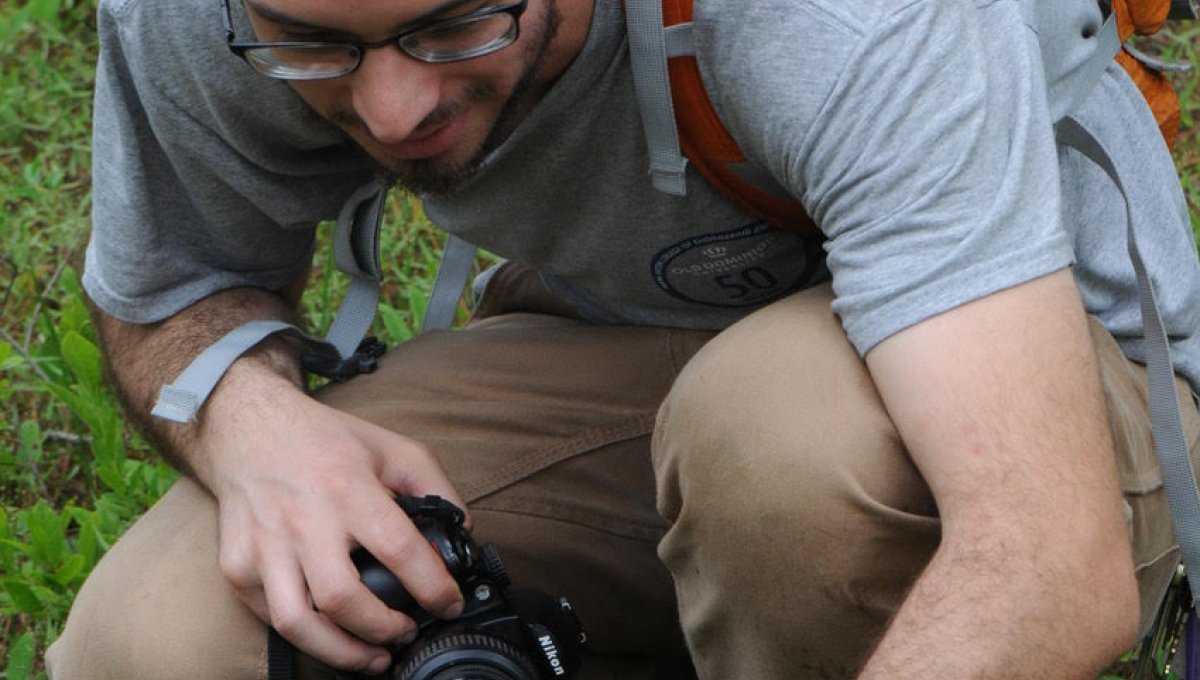
Peter Schafran examining the Pale Grass Pink Orchid (Calopogon pallidus) at the Blackwater Ecologic Preserve
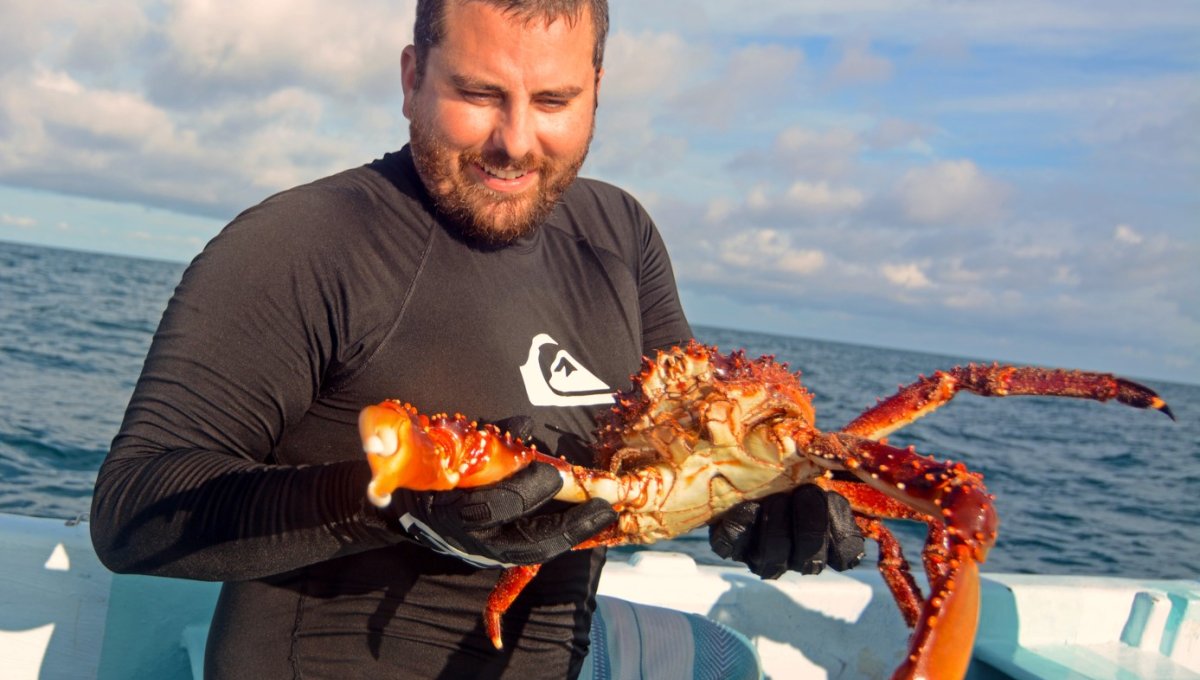
Jason Spadaro with study organism, the Caribbean King Crab (Maguimithrax spinosissimus)
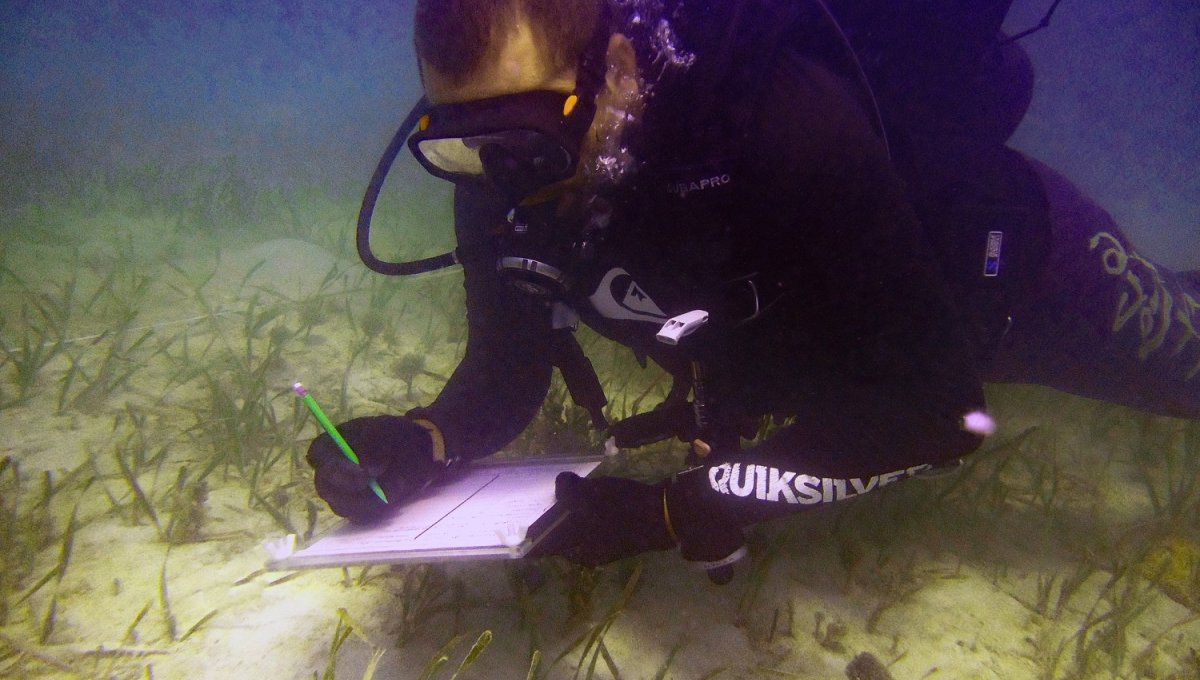
Surveys near the experimental patch reefs where Jason Spadaro conducted most of the initial studies for the work done with the Kirk Wetlands Award funding
Nick Flanders kayaking to a research site in the forested wetlands of Great Dismal Swamp National Wildlife Refuge, Suffolk VA
Charles Sandusky, Old Dominion University Phytoplankton Analysis Laboratory, identifying benthic algal species
Chance Hines extracting a songbird from a mist net at Kiptopeke State Park.
Nick Flanders measuring tree diameters at a research site in the forested wetlands of Great Dismal Swamp National Wildlife Refuge, Camden Co. NC.
Nick Flanders cutting a trail to a research site in the forested wetlands of Great Dismal Swamp National Wildlife Refuge, Suffolk VA
Nick Flanders planting mistletoe seeds at a research site in Great Dismal Swamp National Wildlife Refuge, Suffolk VA as part of a field experiment.
Chance Hines setting up a mist net in high marsh habitat to capture migratory songbirds at Magothy Bay NAP.
Chance Hines measuring vegetation at Kiptopeke State Park.
Peter Schafran examining the Pale Grass Pink Orchid (Calopogon pallidus) at the Blackwater Ecologic Preserve
Jason Spadaro with study organism, the Caribbean King Crab (Maguimithrax spinosissimus)
Surveys near the experimental patch reefs where Jason Spadaro conducted most of the initial studies for the work done with the Kirk Wetlands Award funding
The Paul W. Kirk, Jr. Wetlands Biology Research Awards support undergraduate and graduate student research, including research-related travel, for wetlands biology. Preference is given for botanical topics, but non-botanical topics are considered if they relate to the sustainability of wetland ecosystems as a whole.
During his long career at Old Dominion, the late mycologist Paul Kirk, Jr was an inspirational researcher and teacher who spread his enthusiasm for wetland and marine plants and fungi. Dr. Kirk taught at ODU from 1971 until his retirement in 1992, serving during that time as associate dean for the College of Sciences and Health Professions and as director of the biology master’s degree program. A gift from his son, Dr. Allan Kirk, and Allan’s wife, Robin Kirk, made these awards possible.
Typically, awards will not exceed $1000 for undergraduate students and $3000 for graduate students, but higher requests will be considered with appropriate justification. Undergraduate award recipients will be required to present results at the annual Undergraduate Research Symposium or an alternative professional scientific meeting. Graduate students will be required to present results at a professional scientific meeting or in a department seminar. All awardees will be asked to provide a mid-year update of funds spent by August 31, 2024. Additionally, a written report of results and use of funds is required by December 1, 2024. Doctoral students are expected to submit a proposal to an appropriate agency seeking additional funding to continue their work, and this should be reported in the final award report. Award recipients will be announced by February 2024, and the funds must be spent by the December 31, 2024. Requests for a one-time extension to awarded funds, with a detailed justification and timeline for spending unused funds, can be made in writing to Dr. Lisa Wallace, Chair of the Kirk Fund Committee. Requests for such extensions must be received by December 1 of the current grant year and should be sent via email to lewallac@odu.edu. Unused funds will be returned to the Kirk Fund.
Eligibility
The applicant must be an ODU student in good academic standing. Students from all departments may be considered for a research award, but preference will be given to students in the Department of Biological Sciences. Projects that are not explicitly within wetlands biology will not be considered.
Required application materials:
- Completed cover sheet
- A proposal describing the research project and the specific funding needs. The proposal should include background on the proposal research, a clearly stated research question and hypothesis, a summary of methods for proposed work, and statement of the work's intellectual merit (i.e., contribution to scientific knowledge) or broader impacts (i.e., contribution to society). Relevance of the research to wetland biology must be clearly stated. (2 pages, single-spaced maximum)
- A timeline for completing the proposed research and use of funds. (1 page maximum)
- A detailed budget and justification for the requested funds (salaries are not allowed). Applicants must identify all other current funding for their research and justify the need for a Kirk Wetlands Biology Research Award. (1 page maximum)
- A curriculum vitae or resume. (no page limit)
- A transcript of all completed courses at ODU. (no page limit)
- A letter of support from the faculty research supervisor should be sent separately to Lisa Wallace (lewallac@odu.edu).
Submission of applications
The deadline to submit proposals and support letters is 11:59 PM on December 8, 2023. Applicants should combine items 1-6 in a single PDF named in the following format: LASTNAME_FIRSTNAME_KIRK2024. Letters of support should be sent separately by the faculty research supervisor. All materials should be submitted by email to Dr. Lisa Wallace at lewallac@odu.edu.
Applicants will receive notification via email when their application is received and complete. Incomplete applications will not be considered for an award.
Award Recipients
Ella DiPetto (Ecological Sciences PhD Student, Dept. of Biological Sciences)
- The influence of coastal protection projects on existing saltmarsh vegetation
Sarah Durham (Biology MS Student, Dept. of Biological Sciences)
- Tree ring analysis of Pond Pine and associated pines of the Blackwater Ecological Preserve
Devani Jolman (Ecological Sciences PhD Student, Dept. of Biological Sciences)
- Determining the role of hybrid plants in wetland communities by functional trait analysis
Julianne Jones (Biology BS Student, Dept. of Biological Sciences)
- Habitat utility by herpetofauna at Blackwater Ecological Preserve
Katelyn Overstreet (Ecological Sciences PhD Student, Dept. of Biological Sciences)
- Regional variations in black mangrove tolerance to freezing
Zlatka Rebolledo-Sánchez (Ecological Sciences PhD Student, Dept. of Biological Sciences)
- Spatial variability of plant and soil carbon storage and sequestration in salt marshes in Virginia
MyKenna Zettle (Ecological Sciences PhD Student, Dept. of Biological Sciences)
- Amblyomma maculatum: The parasite invading Virginia’s wetlands
Kori Carr (Biology BS Student, Dept. of Biological Sciences)
- Understanding maple-gum invasion in freshwater forested swamps using a plant functional trait perspective
Ella DiPetto (Ecological Sciences PhD Student, Dept. of Biological Sciences)
- The effect of environmental heterogeneity on avian diversity along created saltmarshes
Sierra Hildebrandt (Ecological Sciences PhD Student, Dept. of Biological Sciences)
- Assessment of the distribution of living shorelines in Virginia and their functionalities
Harold Jones (Ecological Sciences PhD Student, Dept. of Biological Sciences)
- Factors affecting inter-dunal swale maturation processes
Brandon Martinez (Biology MS Student, Dept. of Biological Sciences)
- Threatened and shrinking: Virginia Sneezeweed
Zlatka Rebolledo-Sánchez (Ecological Sciences PhD Student, Dept. of Biological Sciences)
- Spatial variability of plant and soil carbon storage and sequestration in salt marshes
Victoria Smith (Biology MS Student, Dept. of Biological Sciences)
- Using the stress gradient hypothesis to explain interactions between freshwater forested wetland species along a changing environmental gradient
Victoria Smith (MS Student, Dept. of Biological Sciences)
- Influence of flooding and nutrient loading on carbon dynamics in a forested wetland
Nick Flanders (Ecological Sciences PhD Student, Dept. of Biological Sciences)
- Identification of regional host associations of oak mistletoe (Phoradendron leucarpum) to determine the role of host availability in maintaining mistletoe in forested wetlands
Russell Winter (Ecological Sciences PhD Student, Dept. of Biological Sciences)
- Comparison of nesting success in riparian habitats: why are acorn woodpeckers more successful in sycamores?
Spencer Schubert (Ecological Sciences Ph.D. Student, Department of Biological Sciences)
- Linking frugivory to seed dispersal: Understanding spatial connectivity in fragmented riparian forest communities through DNA barcoding of avian seed dispersers
Nick Flanders (Ecological Sciences Ph.D. Student, Department of Biological Sciences)
- Identification of genetic isolation by habitat in oak mistletoe (Phoradendron leucarpum) to determine the role of avian frugivores in maintaining its association with forested wetlands
Russell Winter (Ecological Sciences Student, Department of Biological Sciences)
- A comparison of nesting success in riparian habitats: why are acorn woodpeckers more successful in sycamores?
Tyler Legg (Ocean, Earth, & Atmospheric Sciences Student, Department of Ocean, Earth, & Atmospheric Sciences)
- Analysis of subsurface geological strata that control hydrologic dynamics in rare botanical wetland habitats
Spencer Schubert (Ecological Sciences Ph.D. student, Department of Biological Sciences)
- Effects of artificial perch installation and microhabitat modification in accelerating
riparian forest wetland restoration in abandoned tropical pastures
Kallie Brown (Masters student, Department of Ocean, Earth & Atmospheric Sciences)
- Sustaining a mangrove forest platform despite anthropogenic and climate-induced
change
Carmen Zayes (Biological Oceanography Ph.D. student, Department of Ocean, Earth & Atmospheric Sciences)
- Molecular effects of responses of eurythermal and stenothermal populations of Zostera
marina L (eelgrass) to climate change
Bryce Shoup (Masters student, Department of Ocean, Earth & Atmospheric Sciences)
- Actual evapotranspiration rates for different vegetation groups may control
groundwater dome asymmetry, First Landing State Park, Virginia
Nick Flanders (Ecological Sciences Ph.D. student, Department of Biological Sciences)
- Using remote cameras to assess the diversity of avian frugivores that use oak mistletoe (Phoradendron lecarpum) in forested wetlands of southeastern Virginia
Chance Hines (Masters student, Department of Biological Sciences)
- Indirect benefits of an invasive wetland plant
Leah Gibala-Smith (Wetlands Masters student, Department of Biological Sciences)
- Influence of hydrology and salinity regimes on bald cypress swamps in the Coastal
Plain of Virginia
Nicholas Flanders (Ecological Sciences Ph.D. student, Department of Biological Sciences)
- Can oak mistletoe (Phoradendron leucarpum) survive on young host trees in forested wetlands?
Jason Spadaro (Ecological Sciences Ph.D. student, Department of Biological Sciences)
- Impacts of crab grazing on coral-algae interactions
Chance Hines (Masters student, Department of Biological Sciences)
- The impact of coastal wetlands and invasive plant species on refueling migratory birds
Charles Sandusky (Masters student, Department of Biological Sciences)
- - The effects of sediment type and light exposure on benthic algae in restored salt marshes
Nicholas Flanders (Ecological Sciences Ph.D. student, Department of Biological Sciences)
- Testing the influence of host availability on the association of oak mistletoe (Phoradendron leucarpum) with forested wetlands in Virginia and North Carolina
Peter Schafran (Ecological Sciences Ph.D. student, Department of Biological Sciences)
- Molecular characterization of wetland orchid mycorrhizal symbionts by PacBio targeted sequencing
Leah Gibala-Smith (Wetlands Masters student, Department of Biological Sciences)
- Influence of hydrology and salinity regimes on bald cypress swamps in the Coastal Plain of Virginia













